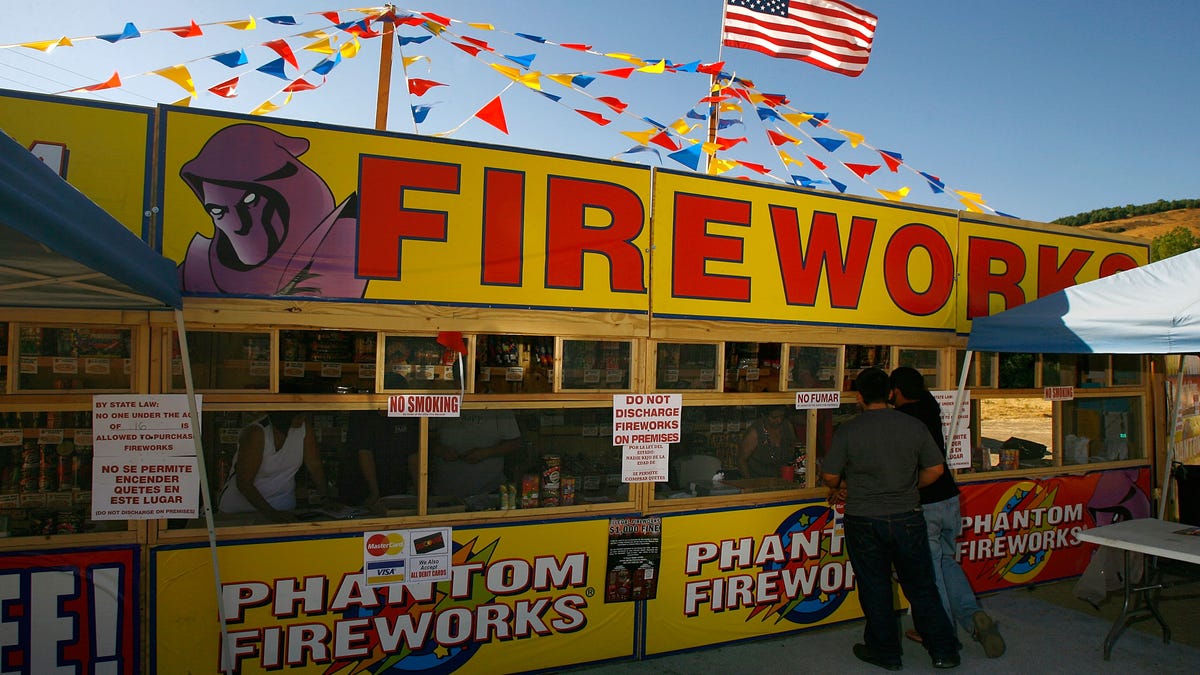Data shows several Americans died from fireworks injuries and thousands were injured last year.

How Americans celebrated July 4th across the country
Americans enjoyed firework displays across the country from the National Mall in D.C. to the Sphere in Las Vegas.
The Fourth of July is anything but celebratory in the Emergency Room.
Every year, doctors amputate fingers and hands damaged by fireworks. They try to save eyes. And sometimes they have to deliver the worst news imaginable to loved ones.
That’s the warning – and the cold hard truth – from doctors who are bracing for another busy Independence Day.
Dr. Nicolas Lee had already amputated the hands of two boys who lost them to firework injuries the week before Fourth of July. He expects to see many more in the coming week.
“These are effectively bombs people are holding in their hands,” said Lee, a professor of clinical orthopedic surgery at the University of California San Francisco who directs a hand reconstruction program. “We see hands and fingers blown off, groin injuries, facial burns and damage. I’ve had kids blow off their eyelids so they can’t close their eyes.”
Even though fireworks are legal in much of the nation and sold widely, they are dangerous and deserve care and respect, said Dr. Jeffrey Goodloe. He’s already seen burns, lacerations and hand injuries from people holding fireworks.
“They’re like military battle wounds,” said Goodloe, an emergency room physician in Tulsa, Oklahoma who’s also vice president for communication for the American College of Emergency Physicians. “These are horrific injuries. People just don’t realize that even publicly available fireworks pack enough punch to rip a finger or a hand off.”
Last year, 11 Americans died from fireworks injuries and more than 14,700 were treated in emergency rooms, according to the U.S. Consumer Product Safety Commission.
In more than one-third of cases, the injuries were burns to the hands and fingers or head, face and ears.
It’s not just big rockets that hurt people. Last year, there were an estimated 1,700 emergency room injuries that only involved sparklers.
One wrong move can change a person’s life – and those people tend to be young. Almost a quarter of injuries are among people between 15- and 24-years-old and most are men. “I don’t remember ever having a woman, it’s always been young men,” said Lee.
“We’re going to see a lot of people who completely changed their lives because they made one simple, bad decision and now either they’ve lost a hand, they’ve lost their eyes, they’ve lost another appendage, or worse,” said Dr. Arvin Akhavan, an emergency medicine physician at the University of Washington.
What are the most common firework injuries?
The most common injury these doctors see is to the hands.
“I’ve seen a number of people where the firework went off in their hand while they were holding it. Either they didn’t have time to set it down or they were thinking they were going to aim it. But it blew up,” said Goodloe.
The hand literally blows apart, said Lee. The joints, bones, ligaments and skin are disrupted or destroyed by the blast. The most common digit to lose is the thumb. “That’s 40% of your hand function,” he said.
“If it’s really bad, the hand looks like a starfish. The fingers, the thumb, all the joints are dislocated and it just splays out,” Lee said.
“We try to save as many fingers as we can, we try to at least give you something to pinch with,” he said. “But sometimes it requires amputation.”
There are also often facial burns, lacerations and injuries as people peer at fireworks. It’s not uncommon for people to lose an eye.
“I would love to show you actual photos of what happens, but it’s too gruesome,” said Chelsea Boe, a hand and microvascular surgeon at the University of Washington in Seattle.
There are also groin injuries, if people are either sitting while they’re lighting the device, or if they drop it and the blast radiates up towards them.
Some injuries are to the solid organs in the core or to the head. “There are people who try to launch them off the top of their head or their chest,” Lee said.
For people setting off fireworks near shorelines or beaches, Lee has also seen injuries from sand that’s cast up by the strength of the explosion.
“The sand becomes thousands of little projectiles. It can get embedded in your skin, in your eyes, in your face. It’s like getting a tattoo,” he said. “It’s hard to get out – you can’t make that many micro incisions. So often you just have to leave it in.”
Fireworks safety tips
The doctors who spend thousands of hours trying to save fingers, hands, eyes and other damage wish – fervently – that people would take a moment to think before they touch fireworks.
“It’s gunpowder with a fuse. They go off with unbelievable force and it goes right through the tissues,” said Boe.
“A lot of time, it’s unsupervised kids. Or it’s young men and boys who get together with their friends,” she said. “They may or may not be drinking or using other substances. They may not be making the best decisions.”
Here’s a few important tips:
- Never hold a lit firework in your hands
- Light fireworks one-at-a-time and then move back quickly
- Never try to re-light or pick up fireworks that have not gone off
- Never use fireworks when impaired by alcohol or drugs
- If you or someone is injured in an explosion, call 911 immediately
The damage Lee sees in the operating room is awful – and unnecessary.
“It’s so devastating and these injuries are entirely preventable,” he said. “I hope this (article) can help at least one person from suffering this way.”
Can fingers be re-attached?
In the movies, a person might light a firecracker and blow off a finger cleanly. They stick it in a bucket of ice, race off to the hospital, and it all gets sewn back together.
Reality is not so forgiving.
“In very few cases, even with a very skilled hand surgeon, are you going to be able to reimplant a finger,” said Goodloe.
The injuries are rarely clean and neat and the amount of damage to the digit is considerable.
“The reality is that when your finger gets blown off, you’ve permanently lost your finger,” he said.
When do firework injuries occur?
While many injuries occur on the actual Fourth of July, the two weeks before the holiday and the two weeks after are very busy in emergency rooms, as people start to play with fireworks they’ve purchased or want to set off fireworks they had leftover from the holiday.
“For hand surgeons, this is our holiday in the worst possible way,” said Boe.
It’s even worse when the Fourth of July happens near a weekend, as it does this year, because people are more likely to make a weekend of it – and to party and drink.
At the University of Washington, which is the main trauma unit for the Seattle region, they saw close to 50 people who required firework injury-related surgery in the four days after the Fourth.
“We do a huge amount of preparation. We have extra teams available, extra operating rooms. We cancel elective surgeries, we try to have extra anesthesia teams available,” she said. “It’s almost like we’re triaging for a mass casualty event.”
(This story has been updated to correct a misspelling/typo.)









